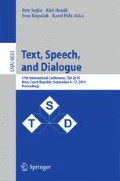Abstract
This paper describes the Alex Dialogue Systems Framework (ADSF). The ADSF currently includes mature components for public telephone network connectivity, voice activity detection, automatic speech recognition, statistical spoken language understanding, and probabilistic belief tracking. The ADSF is used in a real-world deployment within the Public Transport Information (PTI) domain. In PTI, users can interact with a dialogue system on the phone to find intra- and inter-city public transport connections and ask for weather forecast in a desired city. Based on user responses, vast majority of the system users are satisfied with the system performance.
Access this chapter
Tax calculation will be finalised at checkout
Purchases are for personal use only
Preview
Unable to display preview. Download preview PDF.
References
Kate, R.J., Wong, Y.W., Mooney, R.J.: Learning to Transform Natural to Formal Languages. In: Proceedings of AAAI, pp. 1062–1068 (2005)
Mairesse, F., Gasic, M., Jurčíček, F., Keizer, S., Thomson, B., Yu, K., Young, S.: Spoken language understanding from unaligned data using discriminative classification models. In: Proceedings of IEEE International Conference on Acoustics, Speech and Signal Processing, pp. 4749–4752 (2009)
Thomson, B., Gašić, M., Keizer, S., Mairesse, F., Schatzmann, J., Yu, K., Young, S.: User study of the Bayesian update of dialogue state approach to dialogue management. In: Proceedings of Interspeech, pp. 483–486 (2008)
Williams, J., Young, S.: Partially observable Markov decision processes for spoken dialog systems. Computer Speech and Language 21(2), 393–422 (2007)
Povey, D., et al.: The Kaldi speech recognition toolkit. In: Proc. ASRU, Hawaii, US, pp. 1–4 (December 2011)
Public Transport Information System for Czech Republic (2014), https://ufal.mff.cuni.cz/alex-dialogue-systems-framework/ptics
Žilka, L., Marek, D., Korvas, M., Jurčíček, F.: Comparison of Bayesian Discriminative and Generative Models for Dialogue State Tracking. In: SIGDIAL 2013: Proc. of the 14th Annual Meeting of the Special Interest Group on Discourse and Dialogue, Metz, France, pp. 452–457 (2013)
He, Y., Young, S.: Semantic processing using the Hidden Vector State model. Computer Speech & Language 19(1), 85–106 (2005)
Jurčíček, F., Švec, J., Müller, L.: Extension of the HVS semantic parser by allowing left-right branching. In: Proceedings of ICASSP, pp. 4993–4996 (2008)
Zhu, J., Hastie, T.: Kernel logistic regression and the import vector machine. Journal of Computational and Graphical Statistics 14(1), 1081–1088 (2005)
Zettlemoyer, L.S., Collins, M.: Online learning of relaxed CCG grammars for parsing to logical form. In: Proceedings of the 2007 Joint Conference on Empirical Methods in Natural Language Processing and Computational Natural Language Learning, pp. 678–687 (2007)
Korvas, M., Plátek, O., Dušek, O., Žilka, L., Jurčíček, F.: Free English and Czech telephone speech corpus shared under the CC-BY-SA 3.0 license. In: Proceedings of International Conference on Language Resources and Evaluation, pp. 4423–4428 (2014)
The Kaldi ASR toolkit (2014), http://sourceforge.net/projects/kaldi
The Alex Dialogue Systems Framework (2014), https://github.com/UFAL-DSG/alex
Dahl, D.A., Bates, M., Brown, M., Fisher, W., Hunicke-Smith, K., Pallett, D., Pao, C., Rudnicky, A., Shriberg, E.: Expanding the scope of the ATIS task: The ATIS-3 corpus. In: Proceedings of the ARPA HLT Workshop, pp. 43–48 (1994)
Meza-Ruiz, I.V., Riedel, S., Lemon, O.: Spoken Language Understanding in dialogue systems, using a 2-layer Markov Logic Network: Improving semantic accuracy. In: Proceedings of Londial (2008)
Tür, G., Hakkani-Tür, D.Z., Hillard, D., Celikyilmaz, A.: Unsupervised Spoken Language Understanding: Exploiting Query Click Logs for Slot Filling. In: Proceedings of Interspeech, pp. 1293–1296 (2011)
Jurčíček, F., Thomson, B., Young, S.: Reinforcement learning for parameter estimation in statistical spoken dialogue systems. Computer Speech & Language 26(3), 168–192 (2012)
Author information
Authors and Affiliations
Editor information
Editors and Affiliations
Rights and permissions
Copyright information
© 2014 Springer International Publishing Switzerland
About this paper
Cite this paper
Jurčíček, F., Dušek, O., Plátek, O., Žilka, L. (2014). Alex: A Statistical Dialogue Systems Framework. In: Sojka, P., Horák, A., Kopeček, I., Pala, K. (eds) Text, Speech and Dialogue. TSD 2014. Lecture Notes in Computer Science(), vol 8655. Springer, Cham. https://doi.org/10.1007/978-3-319-10816-2_71
Download citation
DOI: https://doi.org/10.1007/978-3-319-10816-2_71
Publisher Name: Springer, Cham
Print ISBN: 978-3-319-10815-5
Online ISBN: 978-3-319-10816-2
eBook Packages: Computer ScienceComputer Science (R0)

